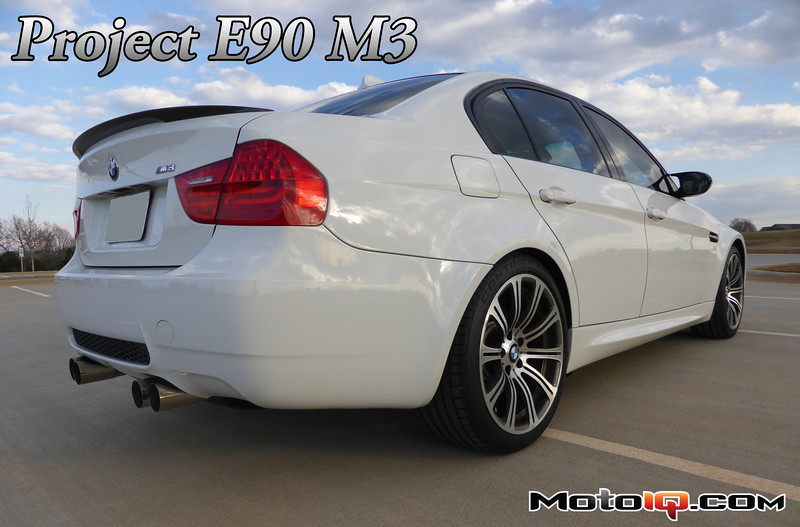
The M3 is the benchmark sports-sedan for a reason. Originally built as a homologation-special for racing, the M3 has always delivered sports car-like performance with the convenience of a small sedan/coupe and the luxury of a BMW. This formula has become so successful that many brands have followed suit with their own offerings. While I’m a fan of pretty much every car in this class, the M3 is arguably the best of the bunch on track.
The 4-door E90 takes this a step further in terms of daily usability and convenience. The goal of this project is to improve the car’s performance without losing sight of the M3’s philosophy or sacrificing daily drivability and comfort by turning it into a loud, stiff, compromised “racecar for the street”, which I have owned plenty of in the past.
With this in mind, we have been on the right track so far with the power increases from Part 1 but the next step was not looking too promising. Cat-back exhausts cost anywhere from $1-4 grand and only make a few hp, if that. Various companies have tried making headers but they’re not really on the market because apparently it’s hard to improve on the equal-length factory ones. Mid-pipes cost anywhere from $1-4 grand; but this is where the power is, the removal of the 400-cell primary cats which are the major choke point in the stock exhaust, creating a claimed 30psi of backpressure. Fortunately, Test Pipes are the most cost effective method and yields the same results as a mid-pipe which costs 3-5 times as much.
 The Macht Schnell “Bypass Track Pipes” (Test Pipes) come with everything you need. The pipes are pre-bent with a thick 2-bolt flange and have O2 bungs TIG-welded in the factory location for a perfect fit and the beefy 2-bolt clamp ensures a strong tight seal.
The Macht Schnell “Bypass Track Pipes” (Test Pipes) come with everything you need. The pipes are pre-bent with a thick 2-bolt flange and have O2 bungs TIG-welded in the factory location for a perfect fit and the beefy 2-bolt clamp ensures a strong tight seal.The real question is what combination of exhaust components improve performance without making the car drone or sacrifice the civilized nature of a modern 3-series BMW. Youtube videos are pretty much useless to determine the pitch and volume of various exhaust systems and so are individual opinions on what is ‘too loud’. While many have said that test pipes cause a foul smell and are too loud even with the stock exhaust, most would agree that mixing test pipes with any aftermarket cat-back result in a package that’s too loud. After taking all of this into consideration, test pipes with the factory mufflers should give us a gain in performance as good as any system out there for a fraction of the cost while hopefully keeping the exhaust note civil.
Macht Schnell is focused primarily on motorsports and takes a strong stance on the function over form statement. All of their products are intended to enhance performance, while maintaining and paying respect to BMW’s engineers and overall design. This sounds right up the alley of this project.
 Once on the lift, the first step was to drop the mid-pipe.
Once on the lift, the first step was to drop the mid-pipe.Once we got the Macht Schnell “Bypass Track Pipes” we stopped by our friends at Kooks Headers’ facility in Statesville, NC for the install. With over 50 years in the business, Kooks makes exhausts for everything from street cars to NASCAR to 3,000hp Pro Modified drag cars, with everything drawn out in CAD to ensure a perfect fit. They also made the exhaust in the Roush #61 Grand-Am car that I raced. While the Test Pipes require no welding and are fairly easy to install with just a handful of wrenches and a hack saw, Kooks is one of the best exhaust manufacturers in the business and just down the street, so why not?
 The stock 400-cell primary catalytic converters are the bottleneck in the S65’s exhaust. Removing them by either going to an aftermarket mid-pipe or the far less expensive test pipes will yield the largest gains in the exhaust department for our M3.
The stock 400-cell primary catalytic converters are the bottleneck in the S65’s exhaust. Removing them by either going to an aftermarket mid-pipe or the far less expensive test pipes will yield the largest gains in the exhaust department for our M3. The M3’s equal-length factory headers are one of the best of any mass-produced production car out there. Check out the spiked 4-1 merge collector.
The M3’s equal-length factory headers are one of the best of any mass-produced production car out there. Check out the spiked 4-1 merge collector.


